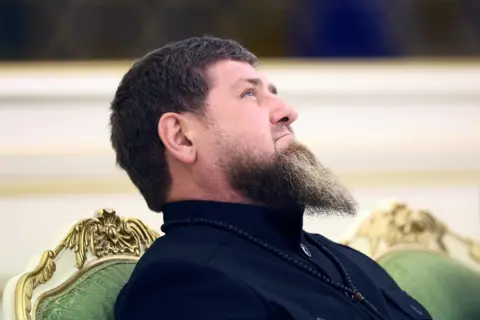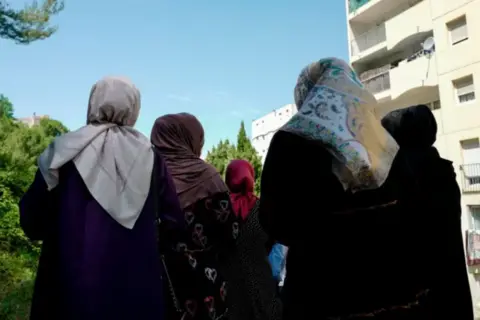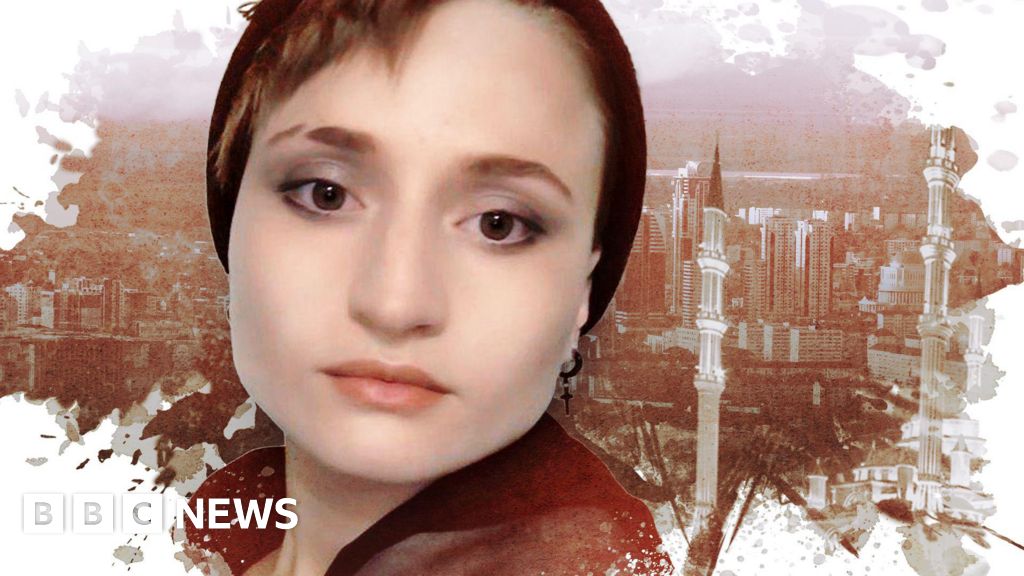
 Aishat Baimuradova/Getty/BBC
Aishat Baimuradova/Getty/BBCWhen 23-year-old Aishat Baimuradova fled her home earlier this year, she believed she finally had a chance to live the way she wanted.
Coming from Chechnya, a conservative Muslim republic in Russia, she cut her hair short, stopped covering her head, shaved off part of her eyebrow and posted quirky selfies on Instagram.
She told her new friends she could finally breathe.
In October, Aishat was found dead in a rented flat in neighbouring Armenia. Police say she was murdered.
Two people were seen leaving the building where she was found, including a woman Aishat had befriended not long before her death. Both reportedly left for Russia soon afterwards.
Russians do not need a passport to enter Armenia; their internal ID is enough. That also makes it an easy route for anyone trying to flee.
Chechnya, in Russia's North Caucasus, is often described by rights groups as a state within a state - a place where power is highly personalised and loyalty to long-standing leader Ramzan Kadyrov often over-rides laws and formal institutions.
For years, human rights organisations have documented enforced disappearances, torture and extrajudicial killings in the republic, as well as systematic persecution of those who dissent.
Chechen officials have consistently denied these allegations, complaining of fabrications aimed at discrediting the region.

 Aishat Baimuradova/Instagram
Aishat Baimuradova/InstagramSeveral high-profile critics of Chechen authorities have been killed abroad.
In 2009, Umar Israilov, a former bodyguard of Ramzan Kadyrov, was shot dead in Vienna, where he had sought asylum. Austrian authorities called the assassination politically motivated and linked the killers to Chechnya.
Former Chechen rebel Zelimkhan Khangoshvili was shot dead in a Berlin park in 2019, in an attack blamed on Russian security services.
But Aishat Baimuradova is the first known Chechen woman to have died in suspicious circumstances, not long after fleeing Russia.
Like many other women who escape the region, she had complained of being controlled by her family. She said she was forced into a marriage, monitored, and barred from leaving home or using her phone. The BBC was not able to reach her family for a comment.
Aishat arrived in Armenia with the help of SK-SOS, a crisis group that helps people facing danger in the North Caucasus. She had complained openly of conservative gender rules and the suffocating control women face in Chechnya.
At first, she worked in a small town, then moved to the capital, Yerevan, hoping for a better job and more opportunities.
To many who flee, such visibility is unthinkable. Most use false names, avoid showing their faces, and refuse to meet new people. Aishat chose a different path. "She really wanted a normal life," her friend who asked to remain anonymous told the BBC. "And she wanted to trust people."

 Reuters
ReutersHer family tried to persuade her to come back, but when nothing came of it they disowned her, according to SK SOS.
"They said to her: 'You are no longer our daughter or our wife. We won't touch you - just don't touch us," Alexandra Miroshnikova, spokesperson for SK SOS, told the BBC.
Her uncle told local media the family had no involvement in her death.
On the night of her death, Aishat was with a woman she had recently met online, who claimed to come from Dagestan, another Russian republic in the North Caucasus.
People who knew Aishat told the BBC it was the woman who had first made contact with her on social media, later coming to Armenia and inviting her to parties.
A man captured with her on CCTV as they left the building where Aishat's body was found was reported by a popular Russian Telegram channel to be of Chechen origin. Investigative outlet Agentstvo identified him as a relative of a businessman close to Ramzan Kadyrov.
Chechen authorities deny any connection to Baimuradova's death, condemning such suggestions as a "terrorist information attack". Officials have also criticised groups assisting women who flee, accusing them of "destroying family traditions".

 VALERY HACHE/AFP via Getty Images
VALERY HACHE/AFP via Getty ImagesArmenian authorities say they are investigating two unnamed people in connection with Aishat Baimuradova's murder, but they have released no further details about them.
Ramzan Kadyrov is sensitive to people criticising Chechnya from abroad, says Michael Dennis, an expert on Chechen politics at the University of Texas.
"The very existence of a diaspora is a clear signal to the entire world that something is wrong in Chechnya. It's a matter of personal pride and political image," Mr Dennis told the BBC.
Since the early 2000s, asylum seekers from Chechnya have been coming to Europe - fleeing first the war and later Kadyrov's repressive rule.
But changes to EU migration policy, followed by visa restrictions for Russians because of the war in Ukraine, have all but closed that route.
That leaves the South Caucasus, where Russians can travel visa-free, as the easiest escape route, but far from the safest.
In July, another escapee, 24-year-old Laura Avtorkhanova, was found in a shelter in Georgia by a group of male relatives who reportedly tried to coerce her into returning to Russia. After being questioned by police she was able to stay safely in Georgia.
For other Chechen women who have fled, Aishat's death has reinvigorated a fear that has haunted them since they left Russia.
Several have told the BBC how even before her murder they had steered clear of community events, avoided speaking Chechen in public and restricted their social media presence.
Now they worry it may not be enough to hide from those who may want to punish them.
"The fear I've lived with all my life - embedded in my DNA - has reawakened with renewed vigour," said one escapee living in Western Europe, who asked to hide her name and precise location.
"It's like sleep paralysis: a monster appears, and I lie there frozen, staring into its eyes. It's the fear of being killed."
"You can escape," she said, "but you never really feel free."
